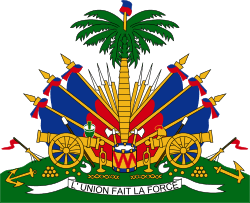Raoul Cédras
| Raoul Cédras | |
|---|---|
| Leader of the Haitian Military Junta De facto | |
|
In office September 30, 1991 – October 8, 1991 | |
| Preceded by | Jean-Bertrand Aristide (as President of Haiti) |
| Succeeded by | Joseph Nérette (provisional) |
| Commander-in-chief of the Armed Forces of Haiti | |
|
In office July 2, 1991 – October 10, 1994 | |
| President |
Jean-Bertrand Aristide Joseph Nerette Emile Jonassaint |
| Preceded by | Herard Abraham |
| Succeeded by | Jean-Claude Duperval |
| Personal details | |
| Born |
Joseph Raoul Cédras July 9, 1949 Jérémie, Haiti |
| Nationality | Haitian |
| Spouse(s) | Yanick Prosper |
| Occupation | Military |
| Religion | Methodist[1] |
Joseph Raoul Cédras (born Jérémie, Haiti July 9, 1949) is a former military officer, and was de facto ruler of Haiti from 1991 to 1994.
Background
Cédras was educated in the United States and was a member of the US-trained Leopard Corps.[2] He also trained with the Spanish military.[3] Cédras was chosen by the US and France to be in charge of security for the Haitian general election, 1990–1991,[2] and subsequently named Commander-in-Chief of the army by Jean-Bertrand Aristide.[2] Under Aristide, Cédras "was one important source for the CIA, providing reports critical of President Aristide."[4]
De facto leader of Haiti (1991–1994)
Cédras was a Lieutenant General in the Forces Armées d'Haïti (the Haitian army) and was responsible for the 1991 Haitian coup d'état which ousted President Jean-Bertrand Aristide on 29 September 1991.
Some human rights groups criticized Cédras's rule, alleging that innocent people were killed by the FAdH military and FRAPH paramilitary units. The US State department said in 1995 that in the three years following the coup "international observers estimated that more than 3,000 men, women and children were murdered by or with the complicity of Haiti's then-coup regime."[5]
While remaining the de facto leader of Haiti as commander of the country's armed forces,[6] Cédras did not retain his position as head of state, preferring to have other politicians as official presidents. As required by Article 149, of the 1987 Haitian Constitution, Haiti's Parliament appointed Supreme Court Justice Joseph Nérette as provisional President, to fill in until elections could be held. The elections were called for December 1991 but were blocked by the American government. Nérette later resigned and was replaced by Supreme Court Justice Émile Jonassaint.
Under the delegation of U.S. president Bill Clinton, the former President Jimmy Carter, accompanied by Senator Sam Nunn and General Colin Powell, urged Provisional President Émile Jonassaint to relinquish his control in 1994, in order to avoid a potential invasion. Jonassaint resigned.[7][8] General Cédras had indicated his desire to remain in Haiti. However, the Americans did not think this was the best solution and convinced the General that in the national interest, he should consider departing for Panama. The United States reportedly rented three properties from Cédras, putting US personnel in them, presumably to protect the houses from being looted.[9]
Later life
After leaving Haiti, Cédras went to Panama where he remains.[10] Aristide then returned to power in Haiti and would be forced into resigning again in 2004.
Documentary
See also
References
- ↑ Zaldivar, R.A. (September 18, 1994). "An Odd Trio Runs Haiti's Armed Forces". Philadelphia Inquirer. Retrieved October 19, 2015.
- 1 2 3 Whitney, Kathleen Marie (1996), "Sin, Fraph, and the CIA: U.S. Covert Action in Haiti", Southwestern Journal of Law and Trade in the Americas, Vol. 3, Issue 2 (1996), pp. 303-332. p321
- ↑ Freed, Kenneth (October 9, 1994). "Despite Rumors, Military Ruler's Fate Looks Settled". Los Angeles Times. Retrieved October 19, 2015.
- ↑ Whitney 1996:322)
- ↑ quoted in Whitney(1996:322)
- ↑ LAWRENCE A. PEZZULLO, Clinton's Errors: Where Policies Went Awry HAITI: POLICY AND PRIESTS U.S. And Haiti -- Uneast Partners, Turbulent Past The Baltimore Sun, September 25, 1994
- ↑ Uphold democracy
- ↑ Usa Today article
- ↑
- ↑
External links
- http://encarta.msn.com/encyclopedia_761576153_8/Haiti.html#p116
- http://www.findarticles.com/p/articles/mi_m1282/is_n23_v45/ai_14753246
- http://news.bbc.co.uk/1/hi/world/americas/942489.stm
| Political offices | ||
|---|---|---|
| Preceded by Jean-Bertrand Aristide |
President of Haïti 1991-1994 |
Succeeded by Jean-Bertrand Aristide |
